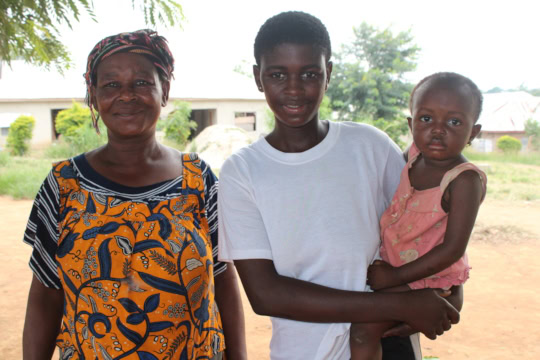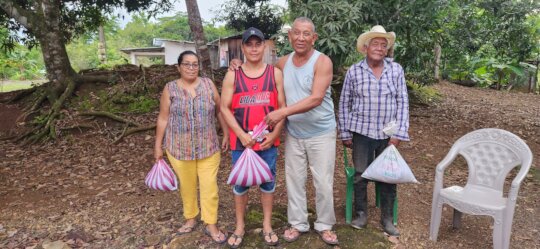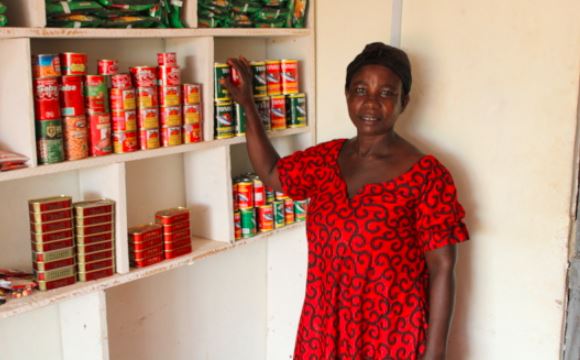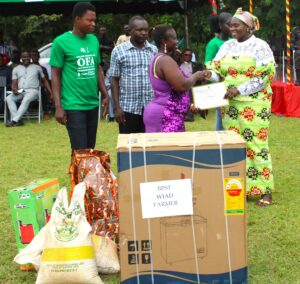The Importance of Learning New Skills
By: Rodolfo Ricardo Hernandez Navas | Agricultural Extension Program Officer
Marcos lives in the province of Río San Juan, Nicaragua, in the community of
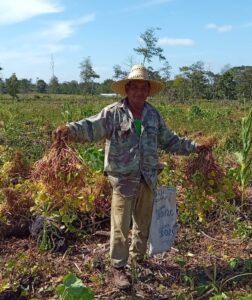
Marcos in his field with his crop.
La Esperanza N°1, near San Carlos. He is single and the father of 5 married sons. Marcos came to his communityat the age of seven with his father, mother and five siblings. At the age of 20 he moved to Costa Rica in search of work and to improve his quality of life. After living there for 20 years and saving his money he returned to La Esperanza N°1 and bought a small farm. Since then, he has stayed in Nicaragua, working his land.
One day Marcos went out to his farm and found one of his friends talking with the agriculture program officer from the Self-Help International (SHI) organization. After greeting his friend, he joined the conversation. He listened carefully when the program officer explained about the work with corn that the organization offers producers. “I was very interested to know about a new variety that gives improved yields at harvest, so I asked the program officer if he had any seed corn to give me. He provided me with 5 pounds with which to experiment. I planted it and I really liked it, so I asked my friend for the phone number of the program officer so I could talk to him and make my next request.”
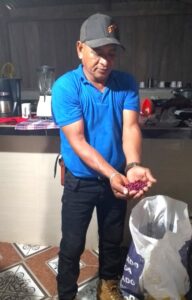
Marcos Showing the Biofortified Beans
“I spoke with him and told him that I had a group of farmers willing to work with SHI. I had told them about the new variety of corn. On good land the production is very good, and it has a sweet and delicious flavor. Then the program officer came to my community and we formed a group. All the members received training about the double-row planting technique and the agronomic management that should be given to the corn. We received follow-up visits and personalized technical advice. In addition, we could consult through a WhatsApp group in case we had any questions or problems about the growth of the corn. That is how the relationship between Self-Help and the group of farmers of the La Esperanza N°1 community came about. We like what this organization does because it helps farmers with low economic resources and gives us management alternatives for our crops. The most important thing is that it brought us a new variety of corn called INTA-Nutrader. The seed we normally use is a combination of many varieties, and at harvest the ears come out with grains of different colors and sizes.”
“I planted the first 5 pounds of corn that they gave me in the traditional way like all the farmers here do. From that harvest I obtained 600 pounds of corn, not counting the baby ears that my family and I consumed. We made white tortillas and other derivatives that we eat here in Nicaragua from the new corn. I saw that this corn had very good weight and adapted to any terrain. From the harvest I used 400 pounds for consumption by my family and animals, I saved 100 pounds for seed for the next planting season, and I sold 100 pounds to two neighboring producers who saw that the variety was good and wanted to experiment with it. These results were without using the double-row training yet.”
For the next planting season our group of producers learned how to implement the double-row technique.
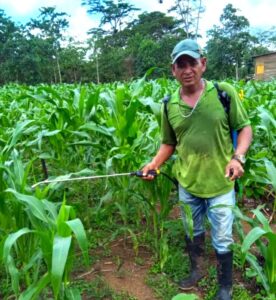
Marcos Spraying His Fields
I planted approximately 1.5 acres of INTA-Nutrader corn using the techniques I learned. I made an application of triple-15 fertilizer 8 days after the corn came up and three applications of urea using 100 pounds per application. I made the first application 18 days after planting, the second 25 days after planting and the last 35 days after planting. I saw that the emergence was very good. The corn was already filling the ears, which were of good size. I expected to harvest about 3,000 pounds, but to my surprise it yielded 5,000 pounds. I was impressed with the results and became convinced that this type of planting does work. I was very happy that I followed the instructions given by the specialist. From the harvest I sold 4,500 pounds for 500 Cordobas per hundredweight (about US$7.50 per bushel), that is, I obtained a total of 22,500 Cordobas (about US$600) from the sale of the corn. I know that it was a low price, but even so I sold it because I wanted to buy another piece of land. With this money I managed to complete the amount required for this purchase. On this land I will plant biofortified beans that were also provided by Self–Help International to my group and me.”
“When I say, “my group” I mean that I am a leader in the community and therefore of that group of producers who are working with the Self-Help agriculture program. The organization provided us with the biofortified beans from a seed bank that they have in the community of San Isidro. Each of the members of my group, including myself, received 10 pounds of biofortified beans, with the only commitment to return as payment double what we received, so the seed bank can grow and benefit more producers in the region.”
“I am a very responsible and demanding person, so I took charge of collecting the beans that were going to be returned as payment, making sure that they were clean and of good quality. I was also present on the visits that the program officer made to the producers in the community because in this way we could all work in the same direction. Now I and the rest of the members of my group have improved seeds to give us a healthier and more nutritious diet. We really like the varieties that they offered us, and we want to continue working with them.”
“Another important thing that I want to mention is that the organization provided us with organic products. I consider them to be very useful for pest and disease control. They helped me control certain pests in my garden, and I would like to continue using these types of products because they are cheaper and more environmentally friendly.”
“I am grateful for the training that the Self-Help International organization provides to small producers like us. I also thank you for allowing this community and its producers to be part of your family, and we hope to continue working together hand-in-hand for the common good. I will continue to urge other farmers to use this variety of maize and the planting system promoted by SHI so that their quality of life also improves.”
“I am grateful to the SHI donors for keeping this organization going and supporting the agricultural sector in Nicaragua to ensure healthy and quality food for us. I say goodbye and thank you.” states Marcos.

